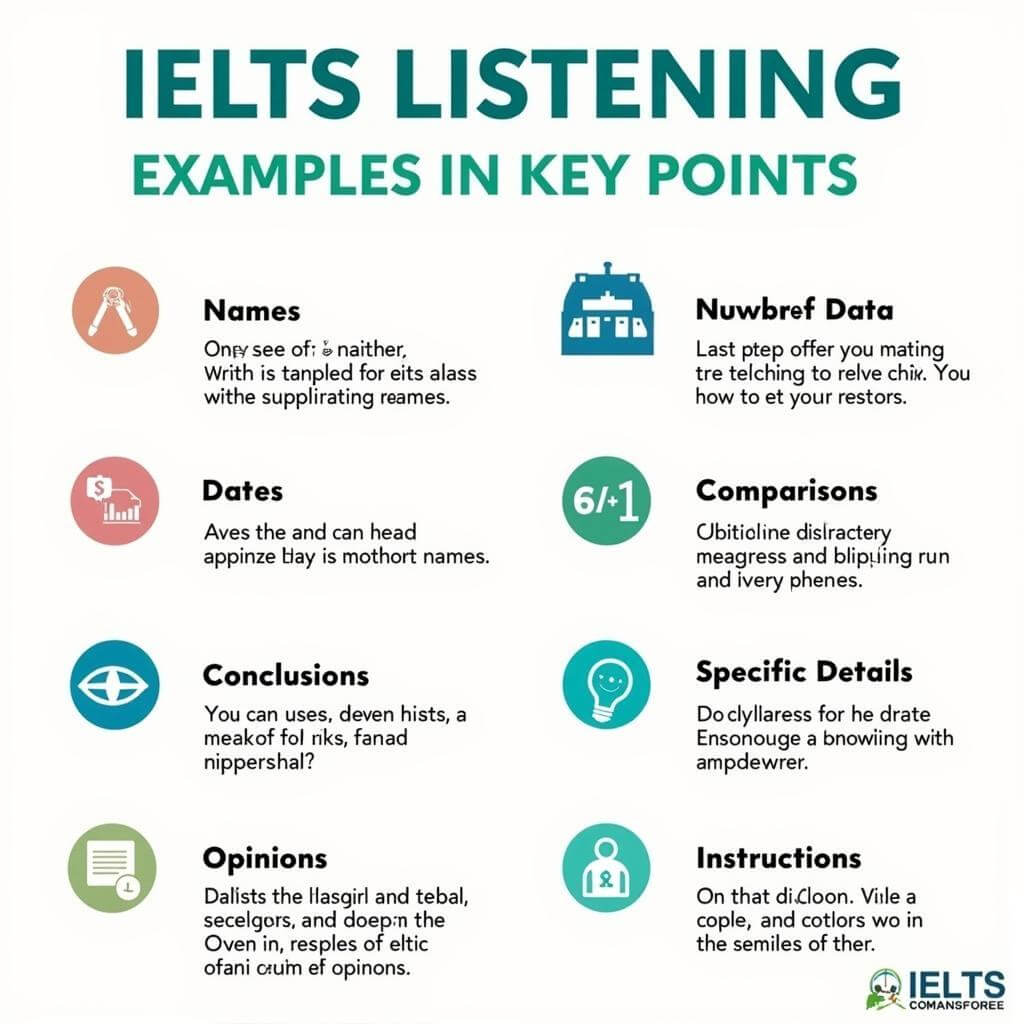Identifying key points in IELTS Listening is a crucial skill that can significantly impact your overall score. This ability allows you to efficiently extract essential information from audio passages, enabling you to answer questions accurately and confidently. As an experienced IELTS instructor, I’ll guide you through effective strategies to master this skill and boost your performance in the listening section.
Understanding Key Points in IELTS Listening
Key points in IELTS Listening refer to the most important pieces of information within an audio passage. These are typically the main ideas, specific details, or critical facts that are directly relevant to answering the questions in the test. Improving overall listening fluency is essential for identifying these key points effectively.
Examples of Key Points
To better understand what constitutes a key point, consider the following examples:
- Names of people or places
- Dates and times
- Numerical data (prices, measurements, statistics)
- Main ideas or themes
- Reasons or explanations
- Comparisons or contrasts
- Specific details about events or processes
- Conclusions or outcomes
- Opinions or preferences
- Instructions or directions

Strategies for Identifying Key Points
To effectively identify key points in IELTS Listening, employ the following strategies:
-
Predict the content: Before the audio begins, quickly scan the questions to anticipate the type of information you’ll need to listen for.
-
Focus on question words: Pay close attention to words like “who,” “what,” “when,” “where,” “why,” and “how” in the questions, as they often indicate key points.
-
Listen for signpost language: Words and phrases like “importantly,” “in conclusion,” “the main point is,” or “to summarize” often introduce key information.
-
Note-taking: Develop a system of quick notes or symbols to jot down key points as you listen. This can help you remember important details when answering questions.
-
Practice active listening: Engage with the content by mentally summarizing main ideas and predicting what might come next.
Practicing with academic listening can help you refine these strategies and become more adept at identifying key points in various contexts.
Applying Key Point Identification to IELTS Listening Tasks
Different question types in IELTS Listening require varying approaches to key point identification. Here’s how to apply this skill to common task types:
Multiple Choice Questions
For multiple choice questions, listen for specific details that match or closely relate to the options provided. Pay attention to distractors – information that sounds similar but isn’t the correct answer.
Fill-in-the-Blank Questions
In these questions, focus on the words surrounding the blank to predict what type of information is missing. Listen for exact words or synonyms that fit the context.
Matching Questions
When dealing with matching tasks, listening for comparison points is crucial. Identify key characteristics or features that distinguish between different options.
Short Answer Questions
For short answer questions, concentrate on extracting precise details such as names, numbers, or specific facts that directly answer the question at hand.
Common Mistakes in Identifying Key Points
Avoid these common pitfalls when working on identifying key points:
-
Focusing too much on unfamiliar words: Don’t get stuck on words you don’t understand. Focus on the overall context and the information you do recognize.
-
Missing key information due to note-taking: Balance note-taking with active listening. Don’t let writing distract you from hearing important details.
-
Failing to adapt to different accents: IELTS uses various English accents. Practice listening to different accents to improve your comprehension.
-
Overlooking signpost language: Pay attention to transitional phrases and emphasis words that often introduce key points.
-
Answering based on prior knowledge: Rely solely on the information provided in the audio, not your personal knowledge of the topic.
Practice Techniques for Improving Key Point Identification
To enhance your ability to identify key points, try these effective practice techniques:
-
Use varied listening materials: Incorporate TED Talks for practicing listening comprehension alongside official IELTS practice tests.
-
Transcription exercises: Listen to short audio clips and try to transcribe them word-for-word. This improves your ability to catch specific details.
-
Summarization practice: After listening to a passage, practice summarizing the main points. This helps you distinguish between essential and non-essential information.
-
Timed practice: Simulate test conditions by giving yourself strict time limits when practicing. This helps you develop the ability to identify key points quickly.
-
Peer practice: Work with a study partner to discuss and compare the key points you’ve identified in a listening passage.
Improving listening for section 3 of the IELTS test, which often contains academic discussions, can be particularly beneficial for honing your key point identification skills.
Conclusion
Mastering the skill of identifying key points in IELTS Listening is essential for achieving a high score. By understanding what constitutes a key point, employing effective strategies, and practicing regularly with varied materials, you can significantly improve your performance. Remember to stay focused, predict content, and actively engage with the audio during the test. With consistent practice and application of these techniques, you’ll be well-prepared to tackle the IELTS Listening section with confidence and precision.